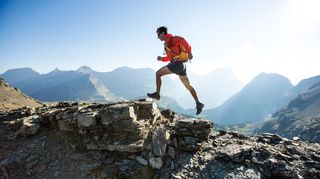
The Night Before
Traditionally, endurance athletes used to spend the entire week before a race bingeing on endless bowls of pasta, but recent studies have discredited this form of extreme carb-loading. So what’s the best approach for topping up your body’s glycogen stores? Keeping things sensible, according to endurance coach Steve Whittle. “Provided you eat a quality, balanced dinner the night before a big training session or event, you’ll be absolutely fine,” he says. “A good example would be a grilled chicken breast with a handful of wholemeal pasta and some nutrient-rich green veg, which will provide a hefty serving of slow-digesting carbs and plenty of protein.”
RECOMMENDED: Carb Loading Before a Marathon
Race Day Breakfast
“Ideally you want to eat breakfast roughly two to three hours before a training session or event to give your body plenty of time to digest it,” says Whittle. “Aim to eat a meal with a mixture of complex and simple carbohydrates, because they will provide you with both slow- and quick-release energy to fuel your efforts throughout the session,” adds sports nutritionist Aaron Deere (kxlife.co.uk). “A wholemeal bagel with honey and peanut butter will cover both bases and offer a bonus serving of protein and healthy fats, without making you feel bloated. If you’re eating ahead of a lengthy afternoon or evening training session, go for an oily fish like mackerel with wholegrain rice, followed by a piece of fruit.”
Snacks During the Event
“If your race lasts less than 90 minutes, you don’t need to worry about refuelling during it,” says Deere. “But once you pass that point, you want to ingest 90g of combined glucose and fructose during every subsequent hour to help replenish your glycogen stores, otherwise your energy levels will nosedive.” There are various options for topping up on the go, including supplements such as energy gels, bars and sports drinks, as well as real food such as flapjacks (although they’re generally only practical to carry, eat and digest if you’re cycling rather than running). It’s crucial to work out which option agrees most with your digestive system well in advance, because you don’t want to be experimenting on race day.
Post-Race Recovery
Replenishing your glycogen levels should be your immediate priority after you cross the finishing line. “You’ve got a two-hour period afterwards when your body is primed for carbohydrate uptake, so replace as much glycogen as you can by consuming up to 180g of carbs during this window,” says Deere. “Ideally this should contain a mixture of glucose and fructose. A jam sandwich on wholemeal bread will provide ideal amounts of both, and it’ll taste great.” Adding some protein will assist with muscle recovery too, although it’s less important following endurance exercise than it is after weight training, because your muscles haven’t been exposed to the same degree of tissue damage. Around 30g will do the job.
Get the Coach Newsletter
Sign up for workout ideas, training advice, reviews of the latest gear and more.
Between 2010 and 2016, Ben was the deputy editor of Men’s Fitness UK, which predated, and then shared a website with, Coach. Ben also contributed exclusive features to Coach on topics such as football drills, triathlon training plans and healthy eating.

